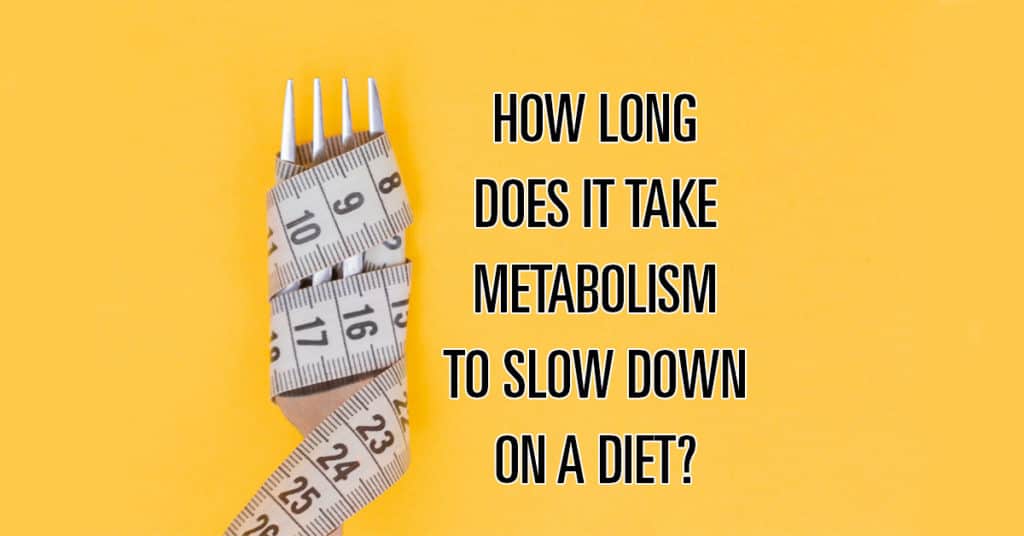
Anyone who has been on a sustained diet will likely cite how easy the weight loss came in the beginning, only for progress to stall in the later stages.
This is due to a phenomenon called metabolic adaptation. To understand metabolic adaptation, it’s important to remember that the body still operates within the context of human evolution.
The body’s sole purpose is to keep you alive by any means necessary. It will adjust and adapt based on anything perceived as a threat to your existence. During a diet, the body perceives the decrease in calories as potential starvation.
In modern times, starvation isn’t a concern in developed countries. But the body doesn’t know there is a 7-Eleven down the street and a drawer full of takeout menus in your kitchen. It thinks a calorie deficit is a sign something is wrong, rather than you simply trying to look good in a bathing suit.
As a result of this calorie deficit, metabolism will eventually slow down in an effort to maintain balance, or homeostasis, in the body. It’s something we have to live with when dieting whether we like it or not. The question is: when does this shift in metabolism occur, and by how much?
On a diet, metabolic adaptation occurs almost immediately. A study in the journal Metabolism showed that metabolic rate slows by 178 calories after one week of dieting. This means the body burns 178 less calories than it normally would.
Over the course of a 6 week period, the metabolic slowdown increased slightly but stabilized overall.
Subjects in the study that returned this statistic were on an aggressive diet, eating 50% of their caloric maintenance. For example, an individual who maintains their weight on 2,000 calories per day was only eating 1,000 calories on the diet. The subjects were also overweight individuals.
The reason this study was chosen is because it was exceptionally well-controlled and designed. They used advanced methods to measure calories burned, and even looked at hormone levels in the process. In addition, there was a 3 week stabilization period before the actual diet took place.
You’d be hard pressed to find a study design better than this one. In addition, there just aren’t too many quality studies in general on metabolic adaptation.
It’s critical to note that there is tremendous inter-individual variability in how much metabolism slows down on a diet. Some people adapt very quickly while others are able to keep losing weight with a given calorie intake. Remember that 178 was the average among multiple participants.
This is an important consideration to keep in mind when structuring your own diet (more on dieting strategies later).
Weight loss and metabolic slowdown are not proportional. When you lose weight at a certain clip, there is a predictive rate at which metabolism should slow down in conjunction. However, this is not the case in real world application.
In other words, your metabolism may slow down considerably even after losing just a couple pounds. Studies show there can be a 10-15% greater reduction in metabolism than anticipated while on a diet.

What Happens When Metabolism Slows Down?
There are several mechanisms in the body which cause a stall in weight loss and a slowing of metabolism on a diet.
When people think about metabolic adaptation, it is usually due to adaptive thermogenesis.
Basal metabolic rate (BMR) is responsible for the majority of the calories you burn every day. It is not from exercise or general everyday movements. Basal metabolic rate is the calories burned from the basic internal processes that keep organs functioning, regulate temperature, allow you to breathe, etc.
On a diet, basal metabolic rate slows down. Obviously the body continues to operate in a normal fashion, but the calories burned from BMR decreases. This is the largest component of adaptive thermogenesis.
An overlooked variable with dieting and metabolism is the decrease in non-exercise activity thermogenesis (NEAT). NEAT is any movement that isn’t formal exercise. This includes walking, hand movements, fidgeting at your desk, among many other things.
A great deal of what constitutes NEAT is spontaneous movement. On a diet, NEAT can slow down considerably. Remember that calories are a form of energy. When you consume less calories than normal you, in essence, have less energy overall.
When you have less energy you are less likely to get up and walk around voluntarily, do chores, or just move in general. These movements add up and contribute to your overall calorie burn.
The reductions in basal metabolic rate coupled with less overall voluntary movement (NEAT) are the major factors which cause energy expenditure to slow on a diet.
What’s worse is that the body is primed for weight regain after a period of dieting. Again, from an evolutionary perspective, the body thinks it’s been through a period of famine. As a result, it wants to put on more body fat (stored energy) should this famine occur again in the future.
This is one reason why it’s not only hard to lose weight, but keep it off as well.
This also highlights the importance of establishing good habits, as opposed to crash dieting and going back to what you used to do. If you can lose weight, and keep the weight off for a considerable amount of time (about 6 months or more), it essentially becomes your “new normal weight.” You then become less likely to gain it all back.
One reason for the potential weight regain, independent from the dietary habits themselves, is a hormone called leptin. Leptin helps to regulate the amount of fat burning and fat storage that occurs in the body partially by increasing and decreasing hunger.
The takeaway point is that the diet isn’t over after the diet. You will be much better served in the long term if you can maintain the weight loss.
This is not to say you should continue losing weight forever. You should set a target for weight loss, reach it, and maintain it for a long as possible.
Does Metabolism Speed Up When Bulking?
Metabolic adaptation works both ways. In overfeeding studies, participants usually experience an increase in metabolic rate. Similar to metabolic slowdown in a calorie deficit, there is great individual variability in this metabolic increase on a bulking diet.
The good news is that there is a proportionally greater increase in metabolism with bulking than predicted from the calorie surplus. This is similar to the proportionally greater decrease in metabolism when dieting. This is important to note when planning long term dietary strategies.
The one caveat is that the increase in metabolism seems to be short lived, particularly when compared to the decrease in metabolism that occurs on a diet. This makes sense from a practical perspective, as it is much easier to put on weight quickly than it is to maintain weight loss.

How Can You Tell if Your Metabolism is Slowing Down?
The metabolism study referenced earlier used a whole-room indirect calorimeter, a tool that measures respiration and calculates calories burned by the CO2 produced from breathing.
Obviously, we don’t have tools like this at our disposal, but calculating changes in metabolism isn’t too difficult. Despite its faults, taking daily weigh-in measurements first thing in the morning is one of the best ways to determine if your metabolism exceeds energy/calorie intake.
In order for this method to work, you must consume the same number of calories and macronutrients each day (or close to it). If weight loss is consistent, there is no need for change. If weight loss stagnates for a week or longer, it is a potential sign that metabolism has slowed.
Daily fluctuations in weight are normal, which is why you need to look at the average over the course of a week or longer.
How to Slow Down Metabolic Adaptation
While metabolic adaptation is inevitable on a diet, there are strategies to combat their effects so you can maintain progress for as long as possible.
Now that we know the two main factors which occur during metabolic adaptation, we can address them individually to try and inhibit their effects.
While you can’t control the reduction in basal metabolic rate, you can change the structure of your diet depending on how adaptive you are personally.
For example, if you are a person who adapts to a reduction in calories very quickly, you may want to implement diet breaks into the plan. Diet breaks are periods of maintenance within an overall dieting phase, usually 1-2 weeks long.
Think of it this way: if your metabolism decreases relatively quickly in response to a calorie deficit, what’s the point of maintaining that same deficit? Theoretically you won’t lose any additional weight and you’ll just be suffering from the lower food intake.
You could conceivably lower the deficit further, which is a viable option, but at a certain point your calories will be so low that it becomes unhealthy.
By implementing diet breaks you are essentially resetting your metabolic rate, priming it for the next phase of calorie reduction.
The easiest way to combat the reduction in NEAT is to use a step tracker. The key is to track steps before the dieting phase, which would establish a baseline for daily steps. If you consume fewer calories but also walk less, then there is no net benefit. However if you are able to maintain that same step output, you should see results.
Other movements factor into NEAT, but it isn’t practical to track hand motions or tapping your feet at a desk.
Summary
Weight loss diets can be frustrating for a number of reasons, one of which is the body’s ever adaptive metabolism.
In response to caloric restriction, the body will slow its metabolism to compensate for the reduction in calories consumed. Tracking weight on a daily basis and maintaining a consistent diet can determine if this is occurring.
To combat these effects, you can change dietary strategy by implementing diet breaks, increasing output in the form of cardio or general activity, or reduce calorie intake further.
Recent Posts
Dieting is a necessary task for anyone looking to achieve maximal fat loss. Even though cardio is a tool that can be used, reducing calories is the more efficient manner of losing fat in the long...
Flexible dieting, or if it fits your macros (IIFYM), rose in popularity in the late 2000’s particularly on the bodybuilding.com nutrition forums. The acronym IIFYM was coined on that forum and...
